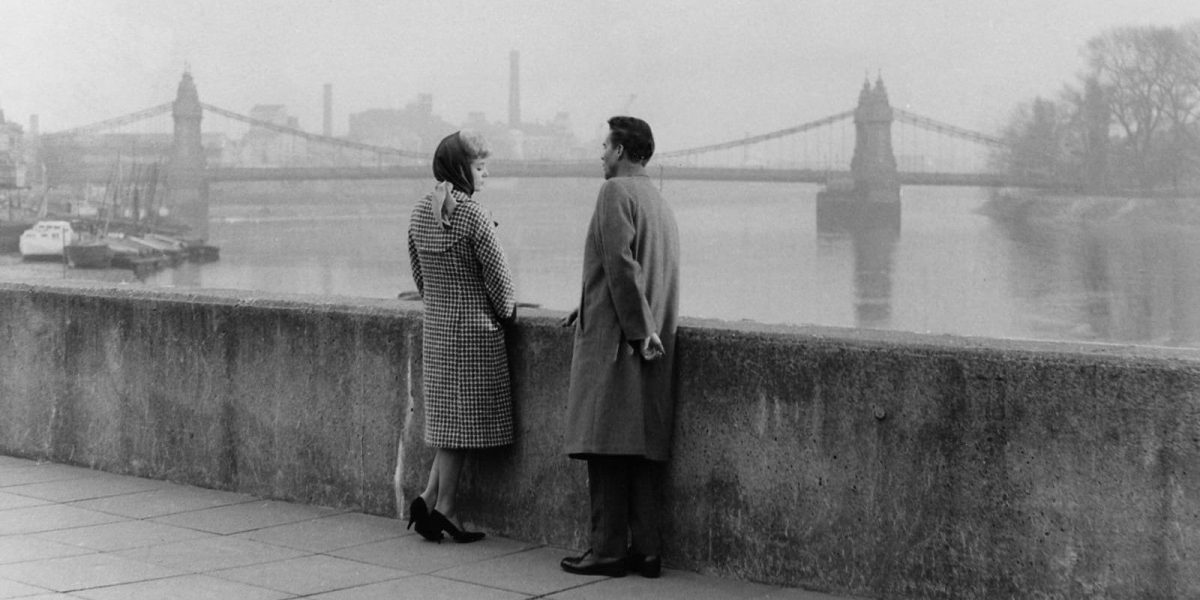
This 100% Rotten Tomato-Rated Noir Thriller Helped Change Society for The Better
Oct 10, 2024
Victim is a 1961 British film noir that is not only a highly regarded film, but was also important in helping to change centuries-old attitudes and laws in the UK against homosexuality. The film works primarily on the strength of its cast, lead by matinée idol Dirk Bogarde, as well as its strong script and precise direction. Many films have been called “ground-breaking” due to their impact on film history, the arts, and society, though only a select few have actually changed laws or public policy. As he cites in his January 2024 article, Juan Orellana identifies Silenced, JFK, and A Short Film About Killing as films that actually inspired changes in law, and Victim is also on that list.
What is ‘Victim’ About?
Image via The Rank Organization
The film follows the events in the life of Melville Farr, a successful married lawyer on track to a judgeship, after the suicide of a young acquaintance, Jack “Boy” Barrett. Though Farr had only known Barrett casually, when the boy admitted sexual feelings for the older man, Farr cut him off, fearing Barrett would try to suggest the feelings were mutual. When notified by the police that Barrett was the victim of a blackmail ring that had been entrapping and extorting queer men, Farr realizes Barrett was reaching out to him for help. Farr makes the risky and radical decision to pursue the prosecution of the blackmailers. In so doing, Farr begins a journey through the world of Barrett’s acquaintances in search of other possible victims willing to identify and testify against the blackmailers. He meets an actor, then a car sales representative, a photographer, and so forth, none of whom will step forward to help. Ultimately, the blackmailers begin to accuse Farr of guilt by association, and only his wife’s love and support help him face consequences on his professional and personal life.
Related The 10 Best British Film Noirs, Ranked While it is true that American film noirs have left an unforgettable imprint on cinema, these British movies also deserve your attention.
Victim was the brainchild of socially progressive British screenwriter Janet Green, who was inspired by the government’s 1957 Wolfenden Committee Report, which recommended reform of the sodomy laws. Green had previously collaborated with director Basil Dearden on a film about racism in the UK and brought him the Victim script, co-written with her husband John McCormack. New York Times critic Bosley Crowther quoted Dearden and producer Michael Relph as intending Victim to be “an open protest against Britain’s law that being a homosexual is a criminal act.” Filming was completed on a minuscule budget of just under $200,000 and a tight schedule of only 10 days. In its initial release, it did quite well and earned more than $65,000 over its cost. Victim’s release also coincided with that of the American film The Children’s Hour, starring Audrey Hepburn, which dealt in a similar way with rumors of lesbianism.
Strict laws forbidding “crimes against nature” between men were punishable by mutilation or death and had existed in Britain since 1533. Well-known writer Oscar Wilde was imprisoned in 1895 for violating these laws. The increased public debate following Victim’s release in 1961 finally led to the decriminalization of consensual acts. The debate in Parliament before the vote in favor of the Sexual Offenses Reform Bill of 1967 noted the change in public sentiment about the subject and accused the existing law of being a license for blackmail and discrimination, which just so happens to be the same argument made in the film.
‘Victim’ Reframes The Problem
The movie Victim refocuses the discussion not on homosexuality but rather on blackmail, a crime for which only the suspicion, not the act, is necessary. The tension between tolerance and the desire to force conformity is always present and swings like a pendulum: back and forth over time. We often see it today in the struggles between the left and right of politics. We’ve seen it in the past with movements like Prohibition, which sought to reduce excess and abuse and instead drove them underground, creating an illegal economy that required violence to defend and maintain, ultimately making criminals of citizens. It’s an all-too-human dilemma: the impulse to do good, resulting in havoc.
Victim was made with an agenda: to bring the unintended consequences of a bad law to the public’s attention. By 1960, the ancient law in the UK criminalizing same-sex acts, rather than reducing or eliminating their occurrence, had instead created an environment ripe for extortion with far-reaching and disastrous consequences. With the benefit of hindsight, we can now see the wisdom of that decriminalization effort. We can now view the film as a piece of history, a well-made and effective piece of propaganda, and as a cautionary tale not to return to those dark times, and the ever-present threat that we might.
‘Victim’ Showcases the Impact of Corruption
Image via The Rank Organization
What’s interesting about the film is how it shows the different impacts of extortion on different people and circumstances. Farr, the central character, is untouched by it until Barrett brings it into his life, whereas the police detective wishes he didn’t have to deal with victimless crimes. His sergeant sees the anti-sex acts law as righteous and has to be reminded by his boss that religions and their beliefs fall in and out of favor arbitrarily over time. An actor and photographer would rather go on with the minor nuisance of paying the blackmail than risk damage to their careers. The car salesman, fearful of losing his family inheritance, turns informant and starts naming names instead, providing the blackmailer with new victims. The blackmailer, closeted and conflicted too, preys on his own kind., The various characters Farr meets on his tour through Barrett’s life help tell the complex story of how social injustice hits the less privileged differently.
Finally, Victim is about integrity, and we see this through Farr’s integrity. When he realizes Barrett needed his help and wasn’t threatening blackmail as he had suspected, Farr realizes that he was also guilty of acting out of the same fear that drove Barrett to suicide — the same lack of courage that drives the other blackmail victims to silence. Farr’s sense of guilt and obligation finally drives him to risk everything to do the right thing. When people of means and power muster the courage to face the exploiters of weakness, justice itself is advanced.
A Courageous Cast and a 100% Tomatometer Score
Image via The Rank Organization
Several actors, including Jack Hawkins, James Mason, and Stewart Grainger had turned down the role of Farr before popular leading man 39-year-old star Dirk Bogarde accepted. A closeted gay man himself, Bogarde at first hesitated to play the role but ultimately embraced the chance to play a role his age that was not based primarily on his good looks. In his autobiography, he wrote, “It was the wisest decision I ever made in my cinematic life.” He adds, “It is extraordinary, in this over-permissive age [the 1980s], to believe that this modest film could ever have been considered courageous, daring, or dangerous to make. It was, in its time, all three.” Reportedly, Bogarde also contributed in writing the scene where he confesses his own same-sex feelings to his wife. Sylvia Syms felt similarly about committing to the role of Farr’s wife, Laura, a role many others had turned down before her. Syms, having worked with John Gielgud (who had been arrested for gay sex early in his career) and having had a family friend commit suicide, felt it was vital to tell this story. Other gay cast members (Dennis Price and Hilton Edwards) were similarly motivated to come out to address the issue.
Victim is a time capsule: it captures its world and its time perfectly. The whole film feels quite real and authentic in the gritty style of the British New Wave of the 60s. The film was the only British entry in the 1961 Venice Film Festival, and one Italian critic even wrote, “At last the British have stopped being hypocrites.” Unsurprisingly, with its taut suspense, grimy settings, and sympathetic portrayals, the film now enjoys a 100% Tomatometer rating from critics on Rotten Tomatoes. In America, the move to decriminalize consensual adult sex acts in private didn’t begin until well into the 1970s. As with banning slavery, the Brits got there first.
Victim is available to watch on Amazon Prime Video in the U.S.
WATCH NOW ON AMAZON PRIME
Publisher: Source link
SpongeBob Cast Shares Heartfelt Favorite Episodes
I asked two main questions throughout our conversation. My first question: It's been 25 years of iconic quotes, hilarious episodes, and memorable moments. From the perspective of the people who voiced the characters and produced the show, is there a…
Dec 23, 2024
Erin Andrews Shares Her Celine Dion-Inspired Holiday Tradition
We interviewed Erin Andrews because we think you'll like her picks. Some of the products featured are from Erin's brand WEAR by Erin Andrews. Our writers and editors independently determine what we cover and recommend. When you buy through our links,…
Dec 23, 2024
TV Shows That Got Canceled In 2024
TV Shows That Got Canceled In 2024 Which 2024 canceled TV show will you miss the most? Share your pick in the comments! Disclaimer: This story is auto-aggregated by a computer program and has not been created or edited by…
Dec 22, 2024
How The Talk Emotionally Ended After 15 Years
The Talk has officially said "Goodbye." After 15 seasons and 2,993 episodes, the CBS daytime show came to an end on Dec. 20 with a heartfelt farewell from hosts Akbar Gbajabiamila, Amanda Kloots, Natalie Morales, Jerry O'Connell and Sheryl Underwood. The episode began with a standing ovation for the…
Dec 22, 2024











